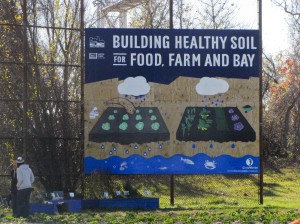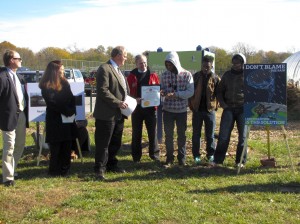Maryland Department of the Environment highlights best practices in stormwater management at Real Food Farm of Civic Works
FOR IMMEDIATE RELEASE:
**SOCIAL MEDIA RELEASE**
Maryland Department of the Environment highlights best practices in stormwater management at Real Food Farm of Civic Works
BALTIMORE, MD (November 20, 2013) – Maryland Department of the Environment (MDE) Secretary Robert M. Summers today kicked off the MDE Stormwater Innovations Tour at Real Food Farm of Civic Works in Baltimore City. Over the next month Secretary Summers will visit stormwater remediation projects throughout Maryland to highlight where government, communities and citizens are working together to find better solutions to managing stormwater runoff in their own backyards. The tour will conclude with the Smart, Green & Growing Clean Water Trade Show in January 2014. For more information on stormwater visit MDE’s stormwater 101 webpage.
MORE INFORMATION:
Real Food Farm is an innovative urban garden that grows fresh produce on six acres of land in Clifton Park in northeast Baltimore. The Farm’s property drains to the Harris Creek Watershed which encompasses seventeen urban neighborhoods and two parks. An underground stream, it is located on the east side of Baltimore and drains approximately two square miles of land area which houses about 44,000 people and empties into the Baltimore Harbor in Canton. The Farm’s stormwater remediation projects include a rain garden, a bioswale and innovative urban runoff re-use project funded by grants from the Chesapeake Bay Trust. This project has created over 6,500 square feet of bioretention, including more than 1,100 native plants and treatment for more than 190,000 cubic feet of annual runoff.
CORE FACTS:
- Through the monitoring and accountability efforts implemented under Baystat, Maryland has led the Chesapeake Bay watershed states by meeting 100 percent of the two-year milestones set for 2010-2011 and 2012-2013.
- Urban and suburban stormwater pollution accounts for 18 percent of the pollution into our rivers, streams, lakes and drinking water reservoirs.
- Under the federal Clean Water Act, the State and federal governments work together with local jurisdictions to curb this large polluting sector by setting targets for stormwater pollution reduction that the jurisdictions must reach.
- Because every jurisdiction is different, the local government drafts its own plan for how it will reach its stormwater pollution goals.
- The local jurisdiction writes the plan, picks the projects that will be implemented under the plan and is responsible to the federal and State governments for how the goal will be met.
- During the 2012 Maryland General Assembly session lawmakers passed House Bill 987 to give local jurisdictions the flexibility needed to set fees that would work for each jurisdiction and a way to fund the pollution reduction projects needed to meet the goals set under the Clean Water Act.
- Maryland is 75 percent of the way toward meeting its 2025 federal pollution diet goal.
- Several jurisdictions have discounts and rebates available for those businesses and residents that have taken steps to reduce stormwater runoff on their properties.
QUOTES:
“ Under the leadership of the O’Malley-Brown Administration, Maryland continues to make great strides in improving water quality, but there is still more that needs to be done. We need to shift the spotlight from the rain and focus on what we put on the land that pollutes our waters and causes erosion and flooding. The importance of clean water to our health and quality of life cannot be underestimated. Stormwater management and projects like the ones at Real Food Farm are a great example of how collaboration among government, non-profits and communities can improve water quality, making our waterways swimmable, fishable and livable for future generations of Marylanders.”
– Robert M. Summers, Secretary, Maryland Department of the Environment
“Implementing best management practices to control stormwater runoff is absolutely critical to the long term success of the Bay restoration effort. At the Chesapeake Bay Trust, we have been incredibly fortunate to partner with the Maryland Department of the Environment and grantees like Real Food Farm to advance stormwater management projects, green infrastructure development, and urban runoff re-use projects that are helping improve the water quality of our streams and rivers.”
– Jana Davis, Executive Director, Chesapeake Bay Trust
IMAGES:
See more images from today’s event on MDE’s Flickr page.
ADDITIONAL INFORMATION:
MDE’s Stormwater 101
Real Food Farm of Civic Works
SGG Clean Water Innovations Trade Show
SGG Award for Innovations in Stormwater Management
MDE MISSION:
Our mission is to protect and restore the quality of Maryland’s air, water and land resources, while fostering smart growth, a thriving and sustainable economy and healthy communities.
# # #


